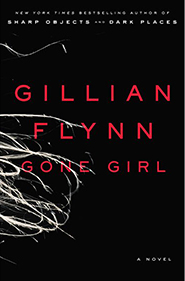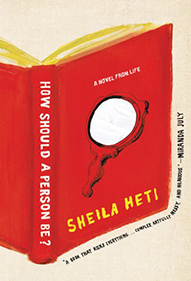by David Abrams
Buy on NOOK »-
March 26, 2013
Semifinals
-
Gillian Flynn
1Gone Girl
v.
3How Should a Person Be?Sheila Heti
-
Judged by
Rachel Riederer
When I saw the list of Tournament books, this was exactly the matchup I hoped not to get. I read and liked both of these books last year. Each one totally consumed me and I recommended both to different people, and for different kinds of reading. How to choose? How Should a Person Be? follows the narrator/author Sheila through friendship, sex, art-making, and her anxiety about all of the above—it is a strange and brave hodgepodge of narration and transcription. Gone Girl is a methodically plotted mystery that alternates between husband-and-wife narrators: Nick telling the story of the days following his wife’s disappearance, and Amy’s diary describing their relationship until the day she turns up missing. Talking about them together is not even like comparing apples and oranges; it is like comparing sunglasses and ladders. They are both great, and when you want one the other is useless.
But talking about how different books are both great in their own ways does not move us closer to a champion. So, onward.
One thing that both books do is force you read them quickly. Gone Girl is a classic page-turner. The sections end with cliffhangers; these are not the subtlest tricks (when Nick walks into the woodshed he’s been led to by clues in a treasure hunt his wife left behind: “I opened the door. Nonononono.”), but they work perfectly. Both narrators are shady, and their stories diverge early on. One or both must be lying to you, so you have no choice but to barrel through the novel and find out which one it is.
How Should a Person Be? is also a page-turner, but in a very different way. I raced through it not because I was in a hurry to find out how a person should be, but because I wanted to understand what is she doing? Heti constantly switches between first-person narration, numbered lists, transcripts, direct address, imagined prayers, and on and on. This creates its own suspense: You have to keep reading, not to answer a question or resolve a plot twist, but to see what she’s going to do next and figure out how this book will hang together. For a book nerd, this question is just as urgent as a whodunit.
So with Flynn’s plot suspense and Heti’s form suspense taken away, for me the contest between them was about which would hold up better upon a second read.
Rereading Heti, I found myself freshly charmed by Margaux. As you might well expect from a book that calls itself a “novel from life” and has a title straight from the self-help section, it can get a little navel-gazey in there sometimes. And just when it’s getting to be too much, Margaux steps in to give voice to the eye-roll you were preparing. Sheila and Margaux see a banner at an art exhibit with a bank logo and a Warhol quote about people having different definitions of beauty; when Sheila asks Margaux what it means she answers, “Oh yeah. It’s saying you can be rich and stupid about art.” Later, some theater people are telling Sheila and Margaux how inspired they are by their recent trip to Johannesburg and Cape Town because “in a place like Africa” you can really see “the colossal injustice of the way our world works economically…It’s so easy to forget.” Margaux—thank goodness for her—answers: “Seems kind of hard to forget; I don’t know.” When the real-life person on whom Margaux is based decides to write her spinoff, I will buy all the copies.
But the whole book is not Margaux delivering calm takedowns to the self-satisfied, and I found myself craving more of her casualness and simplicity. In Heti’s world, no snippet of conversation escapes analysis (“Sheila: Was it too much that I asked for jam and water? Margaux: No.”), and that’s fine, that’s real. But reading these exchanges a second time, I got a little bored. I was not shocked or titillated by repeated blowjob references, I was not intrigued by the shifts in form and what they might mean.
With Gone Girl, I found that the absence of suspense let me slow down and notice enjoyable little details about the book that I’d missed when I’d gobbled it all down in my mania to find out what had happened to Amy. Most of all I appreciated the artistry of Amy’s diary and its trying-too-hard prose. It is bad! Which is to say, it is perfect for the diary of a character who writes magazine quizzes for a living. Reads one entry:
I’m walking along Seventh Avenue making a lunchtime contemplation of the sidewalk bodega bins—endless plastic containers of cantaloupe and honeydew and melon perched on ice like the day’s catch—and I could feel a man barnacling himself to my side as I sailed along, and I corner-eyed the intruder and realized who it was.
Oy, is that exhausting. Doesn’t it make you a little happy that the character who wrote it disappeared and was probably murdered? I found Amy’s bad writing really refreshing and fun—first-person narration in fiction is often so much more articulate and insightful than the character would actually be. Not every character in a novel is going to write and think with the dexterity of a novelist, and I love that Amy doesn’t.
I noticed and liked other details that I had slid past on my first plot-obsessed reading too: the recession-busted backdrop of abandoned malls and McMansions, Nick’s self-consciousness about being handsome, the couple’s shared unease about Amy’s money. There’s also a thread throughout the novel about the difference between how you seem to yourself and how you seem to even the people closest to you, and the challenge of not falling into predetermined roles. “It’s a very difficult era in which to be a person,” Nick notes, “just a real, actual person instead of a collection of personality traits selected from an endless Automat of characters.” Sound like anyone else we know?
In deciding between these two very different books, I mostly relied on the criteria from the ugly painting contest in How Should a Person Be?, what the contest initiator calls “art school ground rules”: “The intention of the work is covered—we have to talk about intentions and what we did and whether what we did translated into what actually happened.”
This is not the answer I thought I would give. But instead of trying to decide how a novel should be, I’m using art school rules and judging in favor of the book that accomplished all the goals it set for itself. I’m not 100 percent sure what Heti’s intentions were. Was she really going to tell us how to be? She made something new and fascinating, and she explored a big question. But I know for certain that Flynn’s intention was to captivate, thrill, and surprise, and Gone Girl does just that, perfectly.
Match Commentary
By Kevin Guilfoile & John Warner
Kevin: “This is not the answer I thought I would give,” Judge Riederer says.
Several years ago I was talking with a group of readers at a bookstore. One woman had a sour frown on her face through much of the discussion. Finally she pointed an accusing finger at me and said, “Do you ever even read any women authors?”
“Of course,” I said.
“Name one,” she said. I named 10. She waved at the air between us. “Well, I never read books written by men.”
A recurring theme of these commentaries is how many people never (or rarely) read beyond their comfort zones, returning again and again to the same authors and genres and subject matter. And what I find most interesting is how many of these readers think they know so much about the books they don’t read.
I’m not talking about Rachel Riederer here, by the way. I just mean that Gone Girl, like The Da Vinci Code a few years back, is a thriller that is being been read by a lot of people who don’t read thrillers, as a rule. And I think The Da Vinci Code—for all the things it does well—kind of confirmed the very limited (and perhaps negative), frozen-in-amber impression that a lot of those reader-tourists had about what a thriller was. One of the things that makes me so happy for Flynn’s success is that a reader who wants to drill down into the text can find oil there if she wants to find it.
Not everyone will. Even here in the ToB comments we’ve seen people who enjoyed Gone Girl but compared it to their The Da Vinci Code experience—it was enjoyable for a thriller. And that’s fine. The wonderful thing about this book is that you can read it on the surface as a page-turner and love every sentence of it. But if you want to, like Judge Riederer, you can explore some of the layers underneath.
John: So, barring what I think is unlikely good news from the Zombie voting, How Should a Person Be? goes home. Based on the amazing action in the reader comments after its quarterfinal victory, it at least takes home a consolation MVCS (Most Valuable Conversation Starter) prize.
The book obviously sparked some passions, including this (self-admittedly hyperbolic) reaction from commenter BradMcGinty: “However this is like giving a homeless person a delicious rib-eye steak and watching them trade it for dog food. Actually, it’s like that IF they don’t have a dog and also you have to watch them eat the dog food while they masturbate in front of the last remaining Blockbuster rental store.”
But what made the whole thing extra great was Sheila Heti making her way into the fray and weighing in with the author’s perspective.
It seems like she might’ve initially been a little taken aback, but her contributions were invaluable in shedding perspective on a part of the Tournament we don’t really consider very often: the authors.
Most book prizes, you don’t know you’ve been seriously considered until you’ve first been singled out as a finalist (chosen from god knows how many other titles?). In the case of the Pulitzer, you don’t even know you’re under serious consideration until you get a surprise phone call.
But here, over the course of a month, we air the laundry, and not all of it’s clean. We invite and unleash passions that can’t—and shouldn’t—be controlled. We joke about this being literary “bloodsport,” but that isn’t really a joke.
The story of the publication of How Should a Person Be? in the States is interesting. Heti apparently had a very hard time finding a publisher, with her previous editor at FSG, Lorin Stein, declining to take on the book. As they were discussing an earlier draft, Heti reportedly pointed Stein toward MTV’s The Hills to help contextualize what she was trying to do. Stein’s response: “It did help me understand something about the novel, but it didn’t bring me any closer to a publishing plan at Farrar, Straus and Giroux.”
I think some of the ire directed at the book and the author feels a little unfair at times. There’s an undercurrent of “why’s she writing about that?” the “that” being generally viewed as the solipsism of a young female writer/artist. I’m not trying to get my feminism card stamped, but these criticisms seem especially common and pointed and even personal when directed at female writers and artists. The comparisons between Girls and How Should a Person Be? seem to be ubiquitous. I haven’t seen even 10 seconds of Girls, but some of the criticism of Lena Dunham appears to be at least partially rooted in attitudes that someone like her shouldn’t be taken all that seriously.
Roth, Updike, and Bellow are world-class solipsists who, for sure, get at least a little grief for it, but at the same time have always been taken seriously. Portnoy’s Complaint and How Should a Person Be? seem to me more alike than different.
Keith Gessen, an editor at n+1 who published an excerpt of How Should a Person Be? that likely helped it find an American publisher, wrote (yes, hyperbole alert) the most solipsistic novel in the history of the English language, All the Sad Young Literary Men, where the true-to-life aspects of the story are perhaps even less veiled than in How Should a Person Be? The trio of main characters act with such self-conscious self-seriousness, you’d think it was meant as a joke except that (unlike Heti’s work) it is decidedly mirth-free.
Gessen’s exploration of the self was treated almost as a necessary rite of passage for a young “literary man” on the make, and its publication helped secure Gessen as one of the permanent players on the New York City literary scene. I’m glad, because it helped bring Heti’s superior novel to our attention.
Kevin: If we made navel-gazing off-limits as a subject for fiction, what would we have left? Looking inward is the thing the novel does best—no other art form is better suited to it. Isn’t nearly the whole of written literature—even the third or so dedicated to elf-on-vampire sex—an effort to explain the moment when human beings became aware of the self, to address the paradox that the primary agent of consciousness, nested somewhere in the brain, remains beyond the mind’s ability to understand it? The self is contained in a black box, close yet impenetrable—even neuroscience has been unable to scratch it. What other tools do we have to try to pick that lock beyond philosophy and literature? Like Roth’s novels, Heti’s book is a smart leather bag of lifters, hooks, and tension tools. I’ll admit my thick fingers could never figure out how to use them, but I respect her for the attempt.
And now we turn to the books that remain.
John: I feel like we need a drum roll because at last, with the impending announcement of the final Zombie picks, we’re down to the only four books that have a chance at the 2013 Rooster.
Kevin: Your early intuition was correct. How Should a Person Be? does not have the votes it needs to make it to the Zombie Round. But in the same way that Pete Rose is not technically in the Baseball Hall of Fame although about six of his bats are on display in the building, we should reserve a place for HSaPB? under glass in the Rooster museum and gift shop. The 2013 ToB would have been a lot less fun without it.
And now for the Zombie matchups. Tomorrow, Natasha Vargas-Cooper will be forced to choose between John Green’s voodoo-cursed The Fault in Our Stars and Chris Ware’s Building Stories. On Thursday, Time magazine’s Lev Grossman will pit Gone Girl versus Adam Johnson’s Romero-fied The Orphan Master’s Son.
One sidebar to these contests, and especially interesting considering all the teeth gnashing over upsets and shark-jumping we’ve seen in the comments and blogs and on Twitter: For the first time in the nine years of the Tournament of Books, the final four novels in the tourney are also the top four vote-getters in the reader poll.
I guess that just proves that the readers are a lot smarter than the seeders.
























